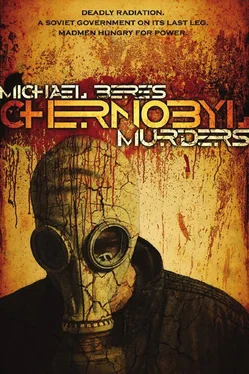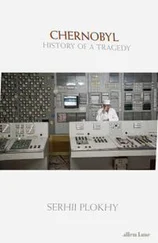Michael Beres - Chernobyl Murders
Здесь есть возможность читать онлайн «Michael Beres - Chernobyl Murders» весь текст электронной книги совершенно бесплатно (целиком полную версию без сокращений). В некоторых случаях можно слушать аудио, скачать через торрент в формате fb2 и присутствует краткое содержание. Жанр: Триллер, на английском языке. Описание произведения, (предисловие) а так же отзывы посетителей доступны на портале библиотеки ЛибКат.
- Название:Chernobyl Murders
- Автор:
- Жанр:
- Год:неизвестен
- ISBN:нет данных
- Рейтинг книги:4 / 5. Голосов: 1
-
Избранное:Добавить в избранное
- Отзывы:
-
Ваша оценка:
- 80
- 1
- 2
- 3
- 4
- 5
Chernobyl Murders: краткое содержание, описание и аннотация
Предлагаем к чтению аннотацию, описание, краткое содержание или предисловие (зависит от того, что написал сам автор книги «Chernobyl Murders»). Если вы не нашли необходимую информацию о книге — напишите в комментариях, мы постараемся отыскать её.
Chernobyl Murders — читать онлайн бесплатно полную книгу (весь текст) целиком
Ниже представлен текст книги, разбитый по страницам. Система сохранения места последней прочитанной страницы, позволяет с удобством читать онлайн бесплатно книгу «Chernobyl Murders», без необходимости каждый раз заново искать на чём Вы остановились. Поставьте закладку, и сможете в любой момент перейти на страницу, на которой закончили чтение.
Интервал:
Закладка:
Komarov realized he had raised his voice. “We are all under pressure, Captain. Because we are not at the disaster scene, you and I must follow through in Kiev before suspects vanish.”
“I still wonder whether more resources should be committed to evacuation.”
Komarov lowered his window, threw his cigarette out, and stared at Azef in silence.
“I’m sorry, Major. I simply wondered about the justification for Moscow assigning security troops to Kiev instead of assigning them to the Chernobyl region.”
“Captain, we have been assigned by the directorate. If you wish to help with evacuation, perhaps I should reconsider your assignment!”
“I wish to continue my current assignment, Major. I was simply considering the magnitude of the situation. The pledge of secrecy issued this morning does not allow me to discuss these things with anyone else.”
They sat in silence for several minutes before Azef spoke again.
“There’s Detective Horvath. He’s coming out of the building.”
“Do you notice a difference in his composure?” asked Komarov.
“Possibly,” said Azef. “He’s looking down as he walks. It’s difficult to say if he received news of his brother. He looks like any other person walking down the street with nothing particular on his mind.”
Azef started the Volga and followed the Zhiguli, which sent out a puff of smoke at each shift of the gears. Detective Horvath turned onto Volodimirski Street and drove slowly, sometimes stopping and waving pedestrians across. Several times, because they drove so slowly, Azef pulled into a parking space and waited before proceeding.
“Do you think he sees us?” asked Azef.
“I don’t know,” said Komarov.
Detective Horvath parked the Zhiguli across from the Cathedral of Saint Sophia, crossed the street, and entered the portico of the cathedral with a group of people being led by a uniformed tour guide.
“Do you think he came to pray?” asked Azef.
“I don’t see why. The cathedral hasn’t had services since the state made it into a museum. Go see what he’s up to.”
While Azef was gone, Komarov watched the cathedral grounds to make certain Horvath would not escape, perhaps finding a back way out. For a moment, Komarov found himself lapsing into his earlier thoughts of Dmitry, his wife, Gretchen, and the knife. But he forced this out of his mind and concentrated on the cathedral.
The upper domes of the cathedral glittered in sunlight turned off and on by clouds blowing across the sky. Scaffolding was set up on one side, with workmen refurbishing a lower greenish dome. All this expense to appease peasants. Someday a work crew would refurbish the office of Deputy Chairman Grigor Komarov. Perhaps someday soon.
Komarov lit a cigarette and waited.
Azef returned out of breath. “I… I had to run to stay ahead.
Here he comes.”
“What was he doing in there?”
“It was strange. He was praying.”
“In what way was it strange?”
“He joined a tour, and I followed. We were in the central nave when it happened.”
“What happened?” asked Komarov impatiently.
“He knelt on the floor. Right there in the middle of all those people, he knelt and started weeping aloud. He raised his hands like an icon. It was incredible. People backed away and made a circle around him. He looked to the ceiling, tears streaming down his cheeks.” Azef pointed out the window. “See those women? They’re still weeping. Everyone was weeping. It was contagious. Even I felt tears in my eyes.”
“He doesn’t look upset now,” said Komarov.
“But it’s true,” said Azef.
They followed Detective Horvath’s Zhiguli the few blocks to militia headquarters. Once Horvath parked and went inside, Komarov radioed for a nearby car to take over and told Azef to drive back to the branch office.
Komarov studied Azef, his eyes red because he had wept with the women in the cathedral. Komarov wondered if his cunning and intelligence instilled as much fear in his enemies as did this fear of the unknown, this irrational fear of a so-called God common among brutes and peasants. Christians, Muslims, Jews, and Gypsies. All the same.
16
On Monday, April 28, the rumor and speculation the government had tried to avoid spread across the Ukraine. Because of its nearness to the disaster site, an explosion of misinformation hit metropolitan Kiev. First came the evacuees who, without official news, brought stories out of proportion like snowballs rolling down hills. These accounts ranged from the entire Chernobyl complex exploding and the town of Pripyat on fire, to citizens collapsing in the streets like insects sprayed with insecticide.
Adding to the speculation was an announcement on Radio Free Europe about high levels of radiation coming from the Soviet Union.
Harsh news would require time for the Soviet News Agency to di-gest and adjust. Continued silence could mean the situation was so far out of control no one knew what to say. Technicians wielding Geiger counters at checkpoints terrified evacuees, as well as citizens of Kiev living on the outskirts near the roadblocks.
But Kievians were used to rumors, and in south and central Kiev life seemed normal. At lunchtime, office workers purchased lunches from vendors along Khreshchatik and, despite the threat of rain, picnicked in the parks along the river. Only a few Kievians hearing the news harbored thoughts of the world’s end, crawling into basements or spending the day on benches in metro air-raid shelters. The usual old women went to church to pray.
The few churches in Pripyat were empty. Residents not yet evacuated were told to seal themselves inside their apartments. Most left on buses Sunday afternoon, some of the evacuees chiding the soldiers forcing them to leave. Soldiers going floor to floor each time a contingent of buses lined up knew little and could only follow orders. The soldiers estimated Pripyat would be all but abandoned the next day.
The sounds in Pripyat came from helicopters passing overhead, army trucks traveling at high speeds, buses lining up, and soldiers shouting through gauze masks, telling residents they had two hours to gather what they could and assemble outside their buildings. Occasionally, when there were no helicopters overhead or trucks or buses on the roads, the soldiers could hear birds and dogs. Birds sang spring songs heralding the cycle of life, not knowing the nests they built here would most likely be doomed. Dogs barked in yards because of the soldiers and because masters had failed to feed them or take them for walks.
Some residents of Pripyat refused to leave. Many were inva-lids who lived alone. Among them was Mihaly and Nina Horvath’s neighbor, the old woman with a cane who had greeted Juli and Marina and Vasily at the Horvath apartment. The old woman stayed in her apartment, fearing looters would take her belongings. On Sunday the woman put her pet canary in its cage out on the balcony.
On Monday morning, finding the canary dead in the cage, the old woman made a flag saying, “Help!” out of a bedsheet and hung it out the window. The canary might have been affected by the radiation or, having been an indoor bird all of its life, might have simply suc-cumbed to the overnight chill. Whatever the reason, the old woman stood leaning on her cane at her window, waiting for soldiers to see her sign from the road and come get her.
In farming villages surrounding Pripyat, people waiting to be evacuated wondered what to do with their livestock. Some piled fodder in barnyards. Others released livestock into fields so they could fend for themselves. Inside farm cottages, kitchen tables were set with plates and cutlery for the number of people living in the cottage. This was for good luck to assure all the residents of the cottage would safely return.
Читать дальшеИнтервал:
Закладка:
Похожие книги на «Chernobyl Murders»
Представляем Вашему вниманию похожие книги на «Chernobyl Murders» списком для выбора. Мы отобрали схожую по названию и смыслу литературу в надежде предоставить читателям больше вариантов отыскать новые, интересные, ещё непрочитанные произведения.
Обсуждение, отзывы о книге «Chernobyl Murders» и просто собственные мнения читателей. Оставьте ваши комментарии, напишите, что Вы думаете о произведении, его смысле или главных героях. Укажите что конкретно понравилось, а что нет, и почему Вы так считаете.












